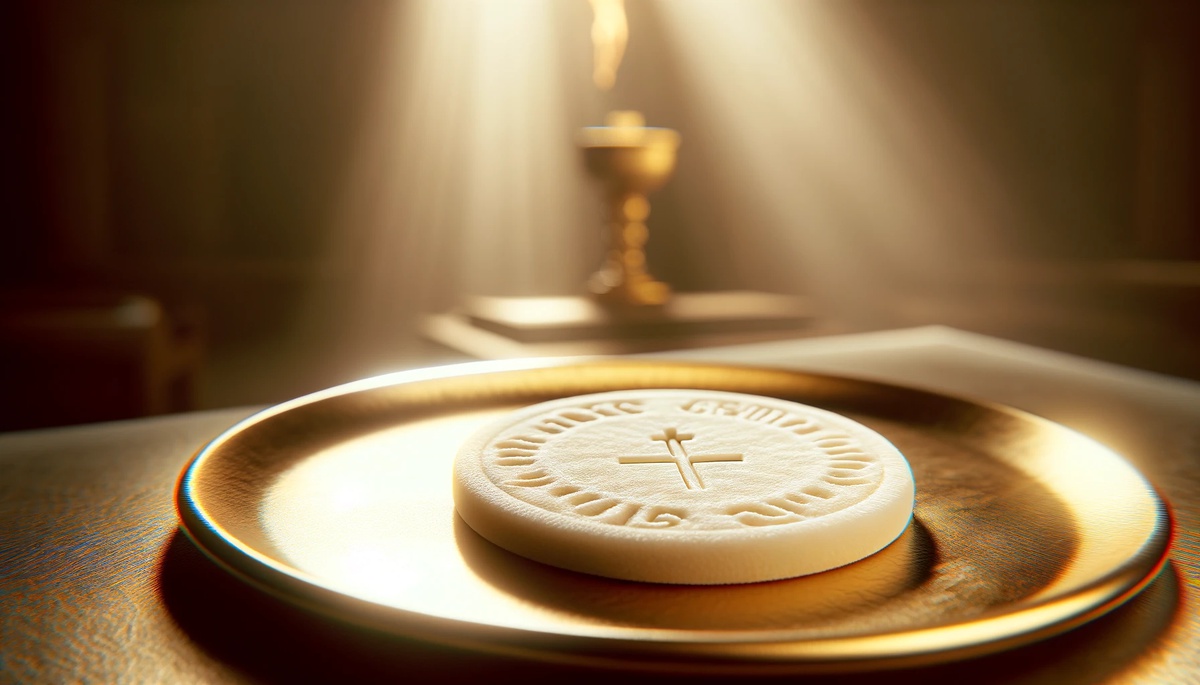Home>Theology and Spirituality>What Is The Prayer For Communion


Theology and Spirituality
What Is The Prayer For Communion
Published: February 25, 2024
Jason DeRose, Managing Editor at Christian.net, uses his expertise in religion and journalism to deepen understanding of faith's societal impacts. His editorial leadership, coupled with a strong academic background, enriches the platform’s diverse content, earning him recognition in both journalism and religious circles.
Discover the significance and practice of the prayer for communion in theology and spirituality. Learn how it enhances the communion experience.
(Many of the links in this article redirect to a specific reviewed product. Your purchase of these products through affiliate links helps to generate commission for Christian.net, at no extra cost. Learn more)
Table of Contents
Introduction
The prayer for communion holds a sacred place in the hearts of many individuals who partake in religious or spiritual practices. It serves as a profound expression of faith, unity, and reverence, embodying the spiritual connection between individuals and the divine. Whether recited in a church, temple, mosque, or any other place of worship, the prayer for communion symbolizes a moment of profound significance, inviting participants to embrace the spiritual nourishment and unity it represents.
The act of communion, in its various forms, has been a cornerstone of religious and spiritual traditions for centuries. It signifies the coming together of individuals in a shared spiritual experience, often accompanied by rituals and prayers that deepen the sense of community and connection. The prayer for communion, in particular, serves as a poignant invocation of the divine presence, inviting participants to partake in a sacred union with the transcendent.
As we delve into the essence of the prayer for communion, it becomes evident that its significance extends beyond the boundaries of religious denominations. It embodies the universal human longing for spiritual nourishment, unity, and transcendence, transcending cultural and geographical divides. Whether expressed through spoken words, silent contemplation, or symbolic gestures, the prayer for communion resonates with the innate human desire to commune with the sacred and experience a sense of oneness with the divine.
In the following sections, we will explore the multifaceted nature of the prayer for communion, delving into its significance, variations, and practical applications. By gaining a deeper understanding of this sacred invocation, we can appreciate its timeless relevance and the profound impact it continues to have on individuals seeking spiritual nourishment and connection.
Read more: 20 Prayers Before Communion
Understanding the Prayer for Communion
The prayer for communion encapsulates the essence of spiritual unity and divine connection. At its core, it serves as a poignant expression of reverence, gratitude, and the longing for spiritual nourishment. Whether recited in a religious service, a private meditation, or a communal gathering, the prayer for communion embodies the universal human yearning for a profound connection with the sacred.
In essence, the prayer for communion acts as a bridge between the earthly realm and the transcendent, inviting individuals to partake in a sacred union with the divine. It serves as a heartfelt invocation, expressing the desire for spiritual sustenance and the recognition of a higher, divine presence. Through its words or silent contemplation, the prayer for communion fosters a sense of reverence and humility, acknowledging the sacredness of the moment and the profound significance of spiritual communion.
Furthermore, the prayer for communion often reflects themes of gratitude, forgiveness, and unity. It provides a space for individuals to express gratitude for the blessings in their lives, seek forgiveness for any shortcomings, and reaffirm their commitment to spiritual growth and unity with the divine. This multifaceted expression of faith and devotion underscores the transformative power of the prayer for communion, as it resonates with the deepest aspirations of the human spirit.
Moreover, the prayer for communion transcends religious and cultural boundaries, embodying the universal human quest for spiritual fulfillment and transcendence. Whether articulated through traditional liturgical texts, personal reflections, or spontaneous expressions of the heart, the prayer for communion speaks to the shared human experience of seeking meaning, connection, and divine grace.
In essence, understanding the prayer for communion entails recognizing its role as a conduit for spiritual communion, gratitude, and unity with the divine. It encapsulates the timeless human longing for transcendence and spiritual nourishment, inviting individuals to partake in a sacred moment of connection with the sacred. As we delve deeper into the significance and variations of the prayer for communion, we gain a profound appreciation for its enduring relevance and its capacity to inspire and uplift the human spirit.
The Significance of the Prayer for Communion
The prayer for communion holds profound significance in the realm of spirituality and religious practice. At its core, it serves as a poignant expression of the human longing for spiritual nourishment, unity, and transcendence. The act of communion, whether in the form of a religious sacrament or a symbolic gathering, represents a sacred moment of connection with the divine and with fellow participants. The prayer for communion amplifies this significance by serving as a conduit for expressing gratitude, seeking forgiveness, and reaffirming the spiritual bond with the sacred.
One of the key aspects of the prayer for communion is its role in fostering a sense of unity and community. As individuals come together to partake in this sacred ritual, the prayer becomes a unifying force, transcending individual differences and fostering a collective sense of belonging. It serves as a reminder of the interconnectedness of humanity and the shared quest for spiritual fulfillment. In this sense, the prayer for communion holds the power to bridge divides and cultivate a spirit of harmony and compassion among participants.
Furthermore, the prayer for communion carries deep spiritual significance, serving as a conduit for expressing gratitude and reverence. It provides a sacred space for individuals to acknowledge the blessings in their lives, express gratitude for the gift of spiritual nourishment, and seek forgiveness for any shortcomings. This act of humble introspection and gratitude underscores the transformative power of the prayer for communion, as it invites participants to cultivate a spirit of humility, gratitude, and openness to divine grace.
Moreover, the prayer for communion serves as a symbolic gesture of spiritual nourishment and sustenance. It embodies the universal human longing for transcendence and spiritual fulfillment, inviting participants to partake in a sacred moment of communion with the divine. Whether articulated through traditional liturgical texts or personal reflections, the prayer for communion resonates with the timeless human aspiration for spiritual nourishment and connection with the sacred.
In essence, the significance of the prayer for communion lies in its capacity to foster unity, gratitude, and spiritual communion. It embodies the universal human quest for transcendence and spiritual fulfillment, transcending cultural and religious boundaries. By embracing the profound significance of this sacred invocation, individuals can deepen their spiritual connection and experience a profound sense of unity and reverence in the communion experience.
Different Versions of the Prayer for Communion
The prayer for communion exists in various forms across different religious and spiritual traditions, each encapsulating the essence of spiritual unity, reverence, and divine connection. These diverse versions of the prayer for communion reflect the rich tapestry of human spirituality and the unique expressions of faith and devotion found across cultures and denominations.
In Christian traditions, the prayer for communion often takes the form of a solemn invocation, expressing gratitude for the sacrificial love of Christ and the spiritual nourishment received through the act of communion. The words spoken during this sacred moment vary among denominations, with some reciting traditional liturgical prayers, such as the "Prayer of Humble Access" or the "Prayer of Thanksgiving," while others may offer personal, heartfelt expressions of faith and devotion.
In the Catholic faith, the Eucharistic prayer holds a central place in the communion ritual, with different versions such as the Roman Canon, also known as the First Eucharistic Prayer, and the Eucharistic Prayer II, each carrying its own solemn language and theological nuances. These prayers serve as a conduit for expressing gratitude, seeking spiritual nourishment, and reaffirming the sacred bond with the divine.
Similarly, in the Eastern Orthodox tradition, the prayer for communion, known as the Anaphora, encompasses a rich tapestry of liturgical texts, each bearing profound theological significance and poetic beauty. These prayers, such as the Anaphora of Saint John Chrysostom or the Anaphora of Saint Basil, convey the timeless truths of the faith and invite participants to partake in a sacred union with the divine through reverent supplication and thanksgiving.
Beyond Christian traditions, the prayer for communion manifests in diverse forms across other spiritual paths. In the Islamic tradition, the act of communion, known as Salat, involves a deeply reverent and communal form of prayer, embodying the spiritual unity of the ummah, or the global Muslim community. Through prostration, recitation of Quranic verses, and supplication, Muslims engage in a profound act of spiritual communion, seeking closeness to the divine and unity with fellow believers.
In Hinduism, the practice of communion finds expression in the sacred ritual of Arati, where devotees offer light, incense, and flowers to the divine, accompanied by devotional songs and prayers. This act of communion symbolizes the soul's longing for union with the divine and the expression of heartfelt devotion through ritual and prayer.
In summary, the prayer for communion encompasses a rich tapestry of expressions across religious and spiritual traditions, each reflecting the universal human longing for spiritual unity, reverence, and transcendence. These diverse versions of the prayer for communion serve as a testament to the enduring power of spiritual communion and the profound impact it continues to have on individuals seeking connection with the sacred.
How to Use the Prayer for Communion
The prayer for communion serves as a sacred and transformative practice, offering individuals a profound opportunity to engage in spiritual communion and express their reverence, gratitude, and longing for divine connection. Whether participating in a religious service, a private meditation, or a communal gathering, the prayer for communion can be utilized in various ways to deepen one's spiritual experience and foster a sense of unity with the sacred.
First and foremost, individuals can use the prayer for communion as a means of expressing gratitude for the blessings in their lives and the spiritual nourishment received through the act of communion. This expression of gratitude serves as a powerful reminder of the abundance of divine grace and the transformative impact of spiritual communion on the human spirit. By acknowledging and appreciating the gifts of the sacred, individuals can cultivate a spirit of humility and openness to the transcendent presence.
Additionally, the prayer for communion can be utilized as a conduit for seeking forgiveness and spiritual renewal. Through heartfelt supplication and introspection, individuals can use this sacred moment to seek reconciliation with the divine and reaffirm their commitment to spiritual growth and transformation. This act of seeking forgiveness fosters a sense of inner peace and renewal, allowing individuals to release any burdens or shortcomings and embrace the transformative power of divine grace.
Furthermore, the prayer for communion can serve as a means of fostering unity and community among participants. Whether recited in a communal setting or as a personal meditation, the prayer embodies the universal human longing for spiritual connection and unity with the sacred. By engaging in this sacred practice together, individuals can experience a profound sense of oneness and shared spiritual purpose, transcending individual differences and fostering a spirit of harmony and compassion.
Moreover, individuals can use the prayer for communion as a vehicle for personal reflection and spiritual contemplation. Through the heartfelt recitation of traditional liturgical texts or the offering of personal prayers, individuals can engage in a deeply reverent and introspective practice, allowing them to deepen their spiritual connection and experience a profound sense of communion with the divine.
In essence, the prayer for communion can be utilized in myriad ways to enrich and deepen one's spiritual experience, fostering gratitude, forgiveness, unity, and personal reflection. Whether expressed through traditional liturgical prayers or personal supplications, the prayer for communion embodies the universal human longing for spiritual nourishment, unity, and transcendence, inviting individuals to partake in a sacred moment of connection with the sacred.
Read more: Prayer For Communion When Not Present
Conclusion
In conclusion, the prayer for communion stands as a timeless and universal expression of the human longing for spiritual nourishment, unity, and transcendence. Across diverse religious and spiritual traditions, this sacred invocation serves as a conduit for expressing gratitude, seeking forgiveness, and fostering a profound sense of unity with the divine. Its significance extends beyond the confines of specific denominations, resonating with the shared human quest for spiritual fulfillment and connection with the sacred.
The prayer for communion embodies the transformative power of spiritual communion, inviting individuals to partake in a sacred moment of reverence and connection with the divine. Whether recited in a communal setting, a private meditation, or a religious service, this sacred practice fosters a sense of unity, gratitude, and spiritual renewal. It serves as a poignant reminder of the interconnectedness of humanity and the shared longing for spiritual nourishment and transcendence.
Furthermore, the diverse versions of the prayer for communion across different religious and spiritual traditions reflect the rich tapestry of human spirituality and the unique expressions of faith and devotion found across cultures and denominations. From traditional liturgical prayers to personal supplications, each version encapsulates the essence of spiritual unity, reverence, and divine connection, underscoring the universal human quest for transcendence and spiritual fulfillment.
The prayer for communion holds the potential to enrich and deepen one's spiritual experience, fostering gratitude, forgiveness, unity, and personal reflection. It serves as a sacred conduit for individuals to express their reverence, seek spiritual nourishment, and reaffirm their connection with the sacred. Whether articulated through traditional liturgical texts or heartfelt personal prayers, the prayer for communion invites individuals to partake in a sacred moment of communion with the divine.
In essence, the prayer for communion transcends cultural and geographical boundaries, embodying the universal human longing for spiritual nourishment, unity, and transcendence. Its enduring relevance and profound impact on individuals seeking spiritual connection underscore its significance as a timeless and transformative practice. As individuals continue to engage in this sacred invocation, they deepen their spiritual connection and experience a profound sense of unity and reverence in the communion experience.














